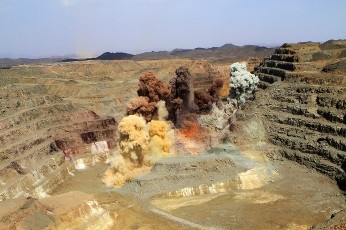Sudan to offer gold exploration licenses as collateral for external loans: official
March 19, 2012 (KHARTOUM) – The Sudanese government has been asked by creditors to provide a collateral in order to get additional loans, an official in Khartoum disclosed today.

“The donors asked for guarantees. [They told us] we have no objection to giving you loans if you grant us blocks with potential for specific [precious] metalsl” Yusuf added.
The official said his ministry has been tasked with providing the finance ministry with information and feasibility studies on potential blocks containing iron, copper and gold. He refused to describe the move as mortgaging the country’s resources.
Sudan has officially made the offer to the creditors who have yet to respond back.
“The offers were presented but I have no knowledge of what [deal] has been reached and we received no information indicating the consent of these donors, but I think we are still in the stage of the discussions and presentations” Yusuf said.
The revelation is the strongest indication to date on the severity of Sudan’s economic crisis and the difficulties faced by Khartoum in obtaining loans.
In an interview this month with the Doha-based Al-Raya newspaper, Sudanese president Omer Hassan al-Bashir revealed that an agricultural project in Sudan’s Nile River state has been put on hold because China cancelled a loan that was needed to extend electricity in the area.
“[T]he project stalled due to China not following through on its funding for the project of extending the electric grid because the Chinese loan was in return for oil shipments which stopped after the secession of the South” the Sudanese leader said.
“And so China stopped the financing [the project]” he added.
Sudan needs a financial lifeline after its economy was thrown into turmoil when South Sudan declared independence in July under the 2005 peace deal, taking with it three-quarters of the oil production, the driving force of both economies. The country’s Sudan’s saw its flow of revenue and foreign currency sharply curtailed.
While Sudanese officials insist that they will quickly find alternative sources of income to make up for the lost oil, analysts expressed doubt that this can be done in the short term. Prices soared in recent months while the currency fell in value as ordinary citizens and corporations flocked to the black market to purchase hard currency.
Several delegations were dispatched to rich Arab Gulf countries seeking help including Saudi Arabia and Qatar.
Qatar promised $2 billion to Sudan in the form of treasury bills and other investments. It came after a meeting between Qatari Emir Hamad Bin Khalifa al-Thani and Bashir on the sidelines of a regional conference hosted by Doha. A delegation from Qatar visited Khartoum to do its assessment on the potential projects.
Sudan has been on the U.S. economic sanctions list for more than a decade over allegations of supporting terrorism as well as human right abuses. Washington says that lifting sanctions is contingent on Khartoum ending its internal wars, ceasing support to terrorist groups and concluding post-secession talks with South Sudan.
The East African nation is also paying around $600 million a year in debt and interest repayments which is a tiny fraction of the $38 billion in outstanding external debt.
(ST)
